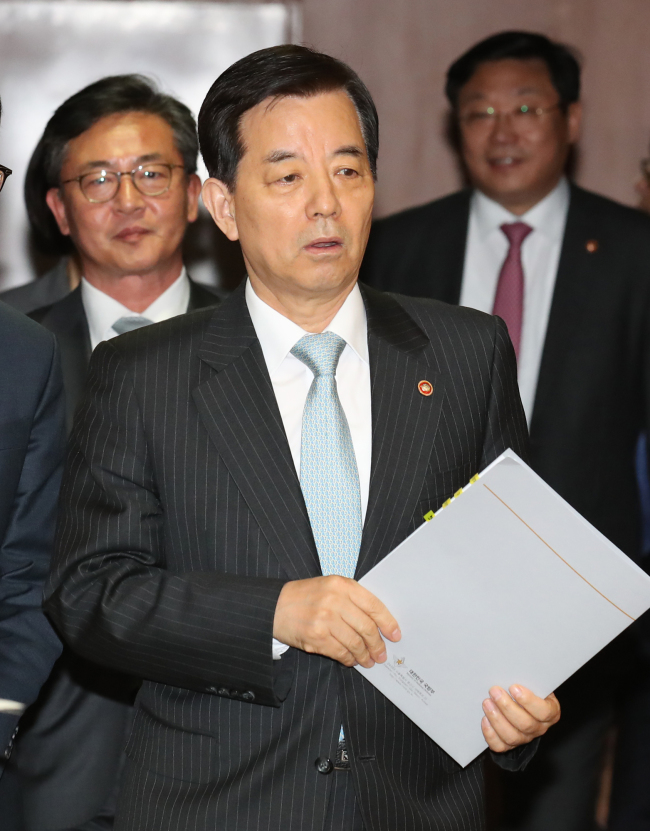Korea, Japan to tentatively sign intelligence-sharing pact next week
By Jo He-rimPublished : Nov. 11, 2016 - 17:32
South Korea plans to tentatively sign an accord to share intelligence on North Korea with Japan as early as next week, Seoul’s Defense Ministry said Friday, amid lingering political and public resistance toward military cooperation.
After two rounds of working-level negotiations, the two countries are expected to hold a wrap-up session in Tokyo followed by the preliminary signing of the General Security of Military Information Agreement, ministry spokesperson Moon Sang-gyun said.
“As the sides reached consensus during the second-round talks (last week), we have requested an advanced review from the Ministry of Government Legislation through the Foreign Ministry,” Moon told reporters at a news briefing.
Once the review is complete without a hitch, the pact will be sent to the weekly intra-agency vice ministers’ meeting and then the Cabinet for approval.
Propelled by North Korea’s evolving nuclear and missile threats, the two nations revived the move early this month, seeking to build on momentum after their settlement of the sex slavery row last December.
Yet military officials and diplomats remain wary, considering Seoul’s last-minute cancelation of an official signing ceremony in 2012 in the face of nationwide backlash over its covert handling of the procedure.
After two rounds of working-level negotiations, the two countries are expected to hold a wrap-up session in Tokyo followed by the preliminary signing of the General Security of Military Information Agreement, ministry spokesperson Moon Sang-gyun said.
“As the sides reached consensus during the second-round talks (last week), we have requested an advanced review from the Ministry of Government Legislation through the Foreign Ministry,” Moon told reporters at a news briefing.
Once the review is complete without a hitch, the pact will be sent to the weekly intra-agency vice ministers’ meeting and then the Cabinet for approval.
Propelled by North Korea’s evolving nuclear and missile threats, the two nations revived the move early this month, seeking to build on momentum after their settlement of the sex slavery row last December.
Yet military officials and diplomats remain wary, considering Seoul’s last-minute cancelation of an official signing ceremony in 2012 in the face of nationwide backlash over its covert handling of the procedure.

As a stopgap step, South Korea and Japan inked a trilateral intelligence transfer arrangement in December 2014, with the US acting as an intermediary.
Some opposition lawmakers and civic groups have criticized the renewed drive for the agreement, accusing the government of pushing for a sensitive deal at a time when the entire nation is befuddled by the Choi Soon-sil scandal.
“We acknowledge the sentiment but given the urgent need for the agreement, we will continue making efforts to persuade the public during the process,” Moon added.
GSOMIA is designed to lay an institutional foundation for the classification, protection and management of intelligence, as well as define exchange methods.
Seoul has sealed the pact with 19 countries including the US, Russia, Australia and Ukraine, and a related arrangement with another 13 nations.
Japan’s military is known to operate a multitude of high-tech surveillance equipment. Among them are several early warning aircrafts and six Aegis destroyers featuring ultramodern radar systems, giving Tokyo an edge in monitoring developments in the North.
By Shin Hyon-hee (heeshin@heraldcorp.com)



![[Herald Interview] 'Amid aging population, Korea to invite more young professionals from overseas'](http://res.heraldm.com/phpwas/restmb_idxmake.php?idx=644&simg=/content/image/2024/04/24/20240424050844_0.jpg&u=20240424200058)













![[KH Explains] Korean shipbuilding stocks rally: Real growth or bubble?](http://res.heraldm.com/phpwas/restmb_idxmake.php?idx=652&simg=/content/image/2024/04/25/20240425050656_0.jpg&u=)

